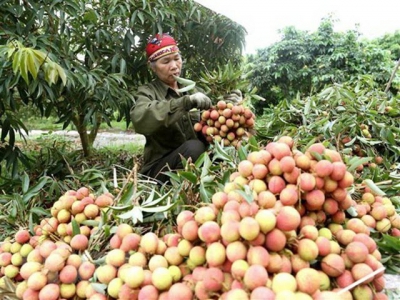Viet Nam fruit, vegetable exporters need to be on top of Chinese policy changes: conference

Ho Chi Minh City – With China making regulations for fruit and vegetable imports more stringent, Vietnamese businesses need to pay close attention to the changes and comply with them, experts told a conference in HCM City yesterday.
Exports of produce to China have shrunk this year due to COVID-19. – VNA Photo Vũ Sinh
According to Tạ Quang Kiên, acting director of the Agricultural Products Processing and Market Development Department’s agriculture produce commercial policies division, China imports US$9-10 billion worth of fruits and vegetables annually and accounts for more than 70 per cent of Việt Nam’s exports.
However, “Việt Nam’s vegetable and fruits exports to China fell by 25.9 per cent in the first nine months of the year.” Besides, growth in exports has been declining since 2015.
Nguyễn Quang Hiếu, head of the plant protection department’s international co-operation division, said China was tightening control over its produce imports and their quality, and requiring exporters to declare farming zone codes and packaging facilities.
China is also working with Việt Nam on updating export protocols for eight of the nine fruits that the latter is able to export, namely dragon fruit, watermelon, banana, rambutan, lychee, jackfruit, longan, and mango.
Đặng Phúc Nguyên, general secretary of Việt Nam Fruit and Vegetables Association, said safety awareness is rising among Chinese and so regulations are becoming stricter, especially with regard to chemicals and disease prevention.
“More farmers should be encouraged to acquire VietGap certification and adopt safe farming practices.”
The Ministry of Agriculture and Rural Development is negotiating to export more new fruits and vegetables to China, including durian and yam.
It will continue to update the list of businesses that can export frozen fruit products to China and focus on issuing codes for farming zones and packaging facilities for export to China.
It is also working with provinces to better understand their challenges and raise awareness of China’s policies on produce imports.
Có thể bạn quan tâm
 Bạc Liêu - Prolonged heavy rain caused severe damages to shrimp and rice fields
Bạc Liêu - Prolonged heavy rain caused severe damages to shrimp and rice fields After heavy rains, farmers need to check pH and basicity for prompt adjustment and bubbling so as to reduce the water stratification in grow-out ponds.
 Sugar industry is concerned about unfair competition
Sugar industry is concerned about unfair competition Farmers have stopped producing sugarcane, causing many factories to close due to lack of raw materials, which is the current situation of the sugar industry
 Fruit, vegetable exports expected to revive after 9-month slump
Fruit, vegetable exports expected to revive after 9-month slump Fruit and vegetable exports are showing signs of recovery after a slump in the first three quarters of the year.